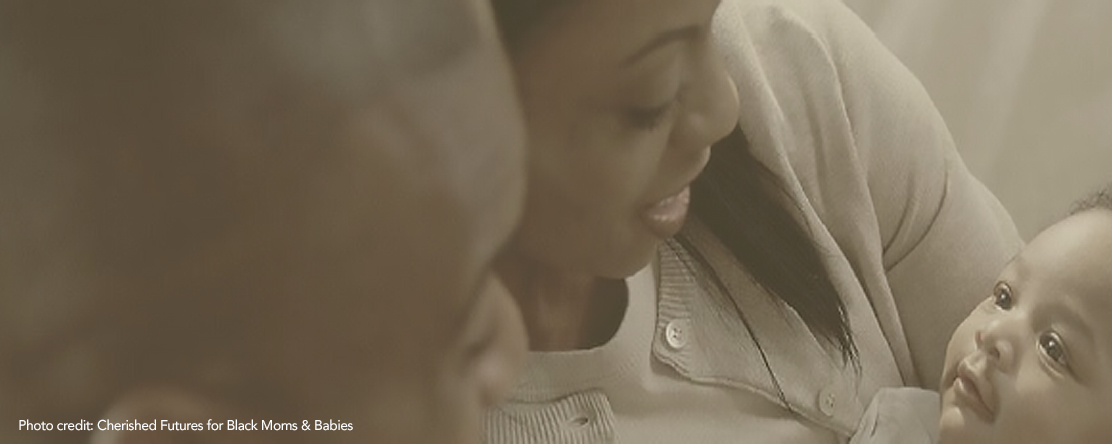
Update
Black Maternal Health Week: Centering Black Women’s Leadership and Experiences
- By Dana Sherrod & Carol Kim
-
Focus Areas
Healthy Communities, Women, Youth & Children -
Issues
Reproductive & Sexual Health -
Expertise
Leadership Development -
Programs
Public Health Alliance of Southern California

By Dana Sherrod, MPH, and Carol Kim, MPP
This week, amid the COVID-19 crisis, organizations, advocates, and policymakers across the nation are virtually celebrating the third annual Black Maternal Health Week and deepening the conversation about Black maternal health in the U.S. While progress has been made, data shows that Black mothers and their babies disproportionately experience higher rates of adverse birth outcomes compared to other groups.
In Los Angeles County, the rate of pregnancy-related deaths is four times higher for Black women compared to White women. The rate of babies born prematurely is also 50% higher among Black women than for White or Asian women. Research shows that these gaps cannot be fully explained by factors such as income, education, or health status, but rather points to systemic racism, toxic stress and biased care.
As local and national conversations continue spotlighting these disparities, it is critical to continue elevating the leadership of Black women, so that we can bring our lived experiences, wisdom, and community-defined solutions to the front and center of the discussion. Many successful movements to improve community health, particularly in Black neighborhoods, originated at the grassroots level. From gathering in church basements or at kitchen tables, Black women have historically strategized and mobilized to make change happen for themselves, their families, and communities, even when faced with limited resources. Los Angeles has its own legacy of Black women leaders working in community-based organizations, health care, and government to advocate for policies and practices to improve Black maternal and infant health—a legacy that serves as the foundation on which our work continues and scales today.
The 2018 Black Paper published by Black Mama’s Matter Alliance—the organization that founded and leads Black Maternal Health Week, writes, “As the United States begins to acknowledge and address Black maternal and infant health, it is essential that all strategies involve the authentic leadership, ingenuity, research, and voices of Black women. The expertise of Black women must directly determine best practices for our own care.”
To be clear, effectuating systems change to save Black moms and babies should not fall squarely on the shoulders of Black women’s advocacy; we each have a responsibility and a vital role to play. That means ensuring Black women are in leadership positions within organizations working to advance birth equity and in health care. It also means investing in initiatives that are for, by, and with Black women.
Here in Los Angeles significant investments are being made to close the birth equity gap, reduce infant mortality and improve maternal patient experiences and safety of Black mothers. Last year, in partnership with Health Net, the Hospital Association of Southern California (HASC) and the Public Health Alliance of Southern California, a program of the Public Health Institute, launched Cherished Futures for Black Moms and Babies (Cherished Futures), an initiative dedicated to doing just that.
Cherished Futures unites leadership from five local hospitals, public health officials, health plans and Black women from the priority communities with the shared goal of co-creating systems change interventions to reduce Black infant deaths and improve patient experiences for Black moms in South Los Angeles, South Bay, and the Antelope Valley.
To ensure Black women have a seat at the decision-making table, Cherished Futures adopted a novel approach by implementing a community advisor role. Community advisors are Black women community leaders, researchers, and clinicians from the priority areas– who are assigned to each hospital team to support the creation of actionable, community-informed implementation plans. In addition to engaging community advisors as part of the hospital teams, Cherished Futures will also host a series of sister circles and virtual conversations to engage Black women in the larger community about important considerations for the hospital implementation plans.
Cherished Futures is one of many local initiatives that is aligned with the Los Angeles County Department of Public Health’s countywide African American Infant and Maternal Mortality (AAIMM) initiative which aims to close the Black-White gap in infant deaths by 30% by 2023. The Department recently launched a $1 million initiative to provide no-cost doula services to African American women in LA County.
There is a necessary and empowering groundswell of activity to address birth inequities throughout the county. Black women-led community-based organizations, researchers, advocates, doulas, clinicians, and many others are working together to build solidarity and turn the tide on this persistent issue.
It is our hope, not just during Black Maternal Health Week, but every week, that we develop a culture that listens, respects and protects Black mothers and families, deferring to the wisdom of their lived experience, and supporting grassroots organizations already doing the work, all to bring about real change.
Dana Sherrod, MPH, is the Perinatal Equity Manager with the Public Health Alliance of Southern California and project lead for Cherished Futures for Black Moms and Babies.
Carol Kim, MPP, is the Vice President of Community Investments & Government and Public Affairs at Health Net, a subsidiary of Centene Corporation.
More Updates
Work With Us
You change the world. We do the rest. Explore fiscal sponsorship at PHI.
Support Us
Together, we can accelerate our response to public health’s most critical issues.
Find Employment
Begin your career at the Public Health Institute.



